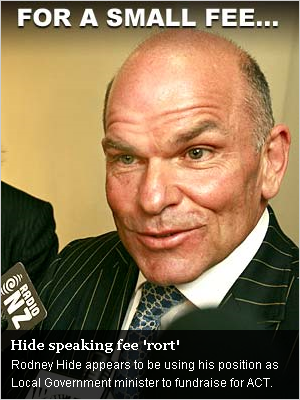This morning at The Standard, vto* questioned how anyone can figure that the TVNZ7 ad featuring Bill English could be political advertising, since it doesn’t contain any baldly partisan political statements.
What is party political about it? Nobody has come with anything specific to support the contention – merely, “it looks political†“I know political when I see it†etc etc. Specifics folks, specifics.
Although I tend to think vto is either being purposefully obdurate or is just simply oblivious, it’s a fair question. Since in my experience he is usually genuinely puzzled rather than just shilling for the blues,** I undertook to do an analysis of the clip for his edification (or ridicule). As I said in the comments thread, you don’t create this sort of thing by accident:
This is a form which has been finely tuned and crafted over half a century to serve a very specific set of purposes — it’s a complex and very challenging medium where every frame, every word, every note is loaded up with as much subtle meaning as possible. With apologies to Tolkien, one does not just walk into political advertising.
A few basics of political discourse, first. While in the case of video, a text is made up of sounds and images, this is different from the ‘words’ and ‘pictures’ vto talks about. There is also a temporal dimension to video: editing, mise-en-scene and lighting changes, camera and focal movement, etc. which I’ll lump in with ‘image’ for these purposes. Likewise, most of the sound is spoken words, but there is also music, which is non-trivial in terms of meaning. The point is that nothing is in there by accident. When you have a limited budget and the requirement to work within a 45 second ad slot, nothing is optional or discretionary.
Given that there are images and sounds, and that they’re all there for a reason, it should be clear that there’s more to analyse than just the words and pictures, and so an apparent absence of political meaning in the words and pictures doesn’t mean the text lacks political meaning; it just means that it’s not overt (or not overt to everyone). The meaning lurks in how the various parts of the text hang together as much as in the ‘words’ and ‘pictures’ themselves. This, also, is purposeful: people are natively suspicious of political messages, and it helps to be able to communicate them via means which people aren’t accustomed to analysing closely. People are very well accustomed to interpreting political speech (‘words’), but much less accustomed to parsing video texts and the subtexts which emerge when multiple texts are intercut with each other in a dense and coordinated fashion. This is what makes video such a strong medium for political communication; why Eisenstein and Riefenstahl and Capra were given such prominent positions in their respective regimes, and why practically every US presidential election since 1960 has been predicted by which candidate’s TV coverage was the stronger.
The clip in question presents a dual narrative which appeals simultaneously to peoples’ cautious, empirical, rational side and to their hopeful, nationalistic, emotional side in order to produce a sense of hope. It is composed of two separate video texts intercut: one featuring footage of Bill English, Minister of Finance and Deputy Prime Minister; and the second of Bill English, kiwi bloke. The topic is the same, and the visual edit minimises the visual difference between the two narratives, while the voice remains constant throughout. This continuity of voice leads us to interpret the statements of Serious Bill and Chipper Bill as if they are uttered by the same person (which they are) and in the same role and context (which they certainly are not). The context is provided by the image, not the sound, and demonstrates that one person can (and should) hold both opinions simultaneously although the relationship between the two narratives is arguable. Of course, people can hold both views simultaneously (though whether they should is another matter).
The first, Serious Bill, establishes the Minister of Finance at a respectful social distance in a dark suit (with cut-ins to tie and face); the Sky Tower and the bright lights of NZ’s commercial capital in the background, a composition chosen to provide authority and credibility. This is a fairly soft form of the tycoon shot, a wealthy man overlooking his glistening domain. He speaks calmly and in technical terms, playing NZ’s economic problems with a straight bat. He uses the first person plural (“we”) throughout in order to include the audience in his statements. He looks the camera (audience) square in the face, talking directly to us.
The second, Chipper Bill, is established in a full-frame headshot, cut from a full-frame headshot of Serious Bill. This is what I mean by ‘minimising the visual distance’ between the Two Bills. He starts with “Y’know”, a commonplace employed more often to tell people what they (should) know than to genuinely appeal to shared common knowledge. This also marks a distinction between the complex, technical language used by Serious Bill and the colloquial, understandable terms and sentiments which follow. It is a relief to hear someone speaking ‘plain english’ after all that techno-jargon, right? Especially when he’s saying something we want to hear: good news about how “we can beat those Aussies”, after the bad news which Serious Bill was talking about, how our we’ve been “underperforming” when compared to them.
Chipper Bill — smiling and personable, an approachable everyman in a patriotically black polo shirt, continues to be intercut speaking in exhortative platitudes about how we just need to “back ourselves” (cut briefly to Chipper Bill gazing into the middle distance) and “apply some old-fashioned Kiwi can-do”, and so on, in response to Serious Bill’s authoritative but somewhat dry and gloomy facts. This use of “old-fashioned” is a hint of a dig at the previous government, the one responsible for “underperforming”; this dig is made a bit more explicit with the enthusiastic “we’re nearly through the tough times and things are looking up” — just leave it to good old National and everything will be well, not like that other lot, who were opposed to everything traditional, right?
The two narratives describe the reality of how things are (described by Serious Bill) and a dream of how things could be (described by Chipper Bill), as the music gradually rises in the background. The clincher, and the factor which makes this more a political advertisement than anything else, is that Bill English is the connection between the two narratives: if you accept the narrative line, he is the key to turning the dream into reality. This is essentially an overarching ‘hope’ narrative, a most powerful sort in troubled times, as Barack Obama realised, and as expressed by Drew Westen in the first chapter of his book The Political Brain, which opens with an analysis of two contrasting video advertisements for Democrat presidential candidates: one successful, for the Clinton campaign, and one unsuccessful, for the Kerry campaign. What was Clinton’s narrative? Hope.***
This ad was not about policy. Its sole purpose was to begin creating a set of positive associations to him and narrative about the Man from Hope — framed, from start to finish, in terms of hope and the American Dream. […] The ad created in viewers a vivid, multisensory network of associations — associations not only to the word hope but to the image of Hope in small-town America in an era gone by.
This “Two Bills” ad creates a similar hope narrative around the putative Kiwi Dream of “beating the Aussies” with “good old Kiwi can-do”. How could anyone not like that?
Just so you’re not starved of policy analysis, there are unstated, non-trivial National party assumptions about what’s important all through the ad too. The prime one among these is a focus on financial metrics (GDP growth, productivity growth) to the exclusion of other considerations. A Labour ad along these lines might have emphasised a balance between economic and environmental and other outcomes such as quality of life — the fact that this ad mentions no other metrics than wealth is not value-neutral or void of political meaning: it demonstrates the writer’s policy priorities and direction. As well as that, the “beating the Aussies” narrative is a core plank of the government’s current policy of “closing the gap” — it’s not policy-neutral either, but is a function of the government’s own preferences and their political strategy of measuring themselves against previous governments on metrics which favour them. And hang on a minute: are we really “through the tough times”, and are things really “looking up”? Depends who you ask; this is a matter of opinion and legitimate professional dispute among Those Who Know About Such Things, it’s not a slam-dunk even if the Finance Minister says so: after all, it’s his job to say so. And will “old-fashioned Kiwi can-do” on its own really be sufficient to bridge the significant productivity and GDP growth gaps between NZ and Australia? What the hell is “old-fashioned Kiwi can-do” anyhow, and if it were that easy, why haven’t we done it all before? The entire narrative is constructed of politically-charged assumptions, but it is formed in such a way as to discourage the audience from thinking too hard about it.
There’s one other thing, too: Plain English is Bill’s newsletter to his constituents, and it looks like the similarities don’t end there. It was a catch-cry of his 2002 election campaign. Perhaps if he’d had this production team working on that campaign he’d have won, or at least done well enough to prevent Don Brash from taking over.
So that’s a reasonably thorough teasing out of the political content of this seemingly-innocuous 45-second commercial. As I said in the comment thread at The Standard, the only thing more absurd than this ad getting made and screened with a straight face is Eric Kearley employing the Lebowski Defence when challenged on the fact that the ad quacks very much like a propaganda duck. Regardless of whether it was bought and paid for, as the more conspiratorial commentators think, or whether the use of the form was simply a (very successful) ploy to garner attention, it’s idiotic to pretend that this isn’t political advertising in function. While I tend to find industrial explanations for apparent media bias more compelling than political explanations, people like Kearley obstinately denying the bleeding obvious doesn’t make it especially easy to keep doing so.
L
* Stands for ‘Vote Them Out’, as I recall.
** What else this implies about vto I leave as an exercise to the reader :)
*** It helped that Bill Clinton was from the town of Hope, Arkansas.

 DPF published two posts yesterday about prominent lefties comparing righties to fascists:
DPF published two posts yesterday about prominent lefties comparing righties to fascists: 